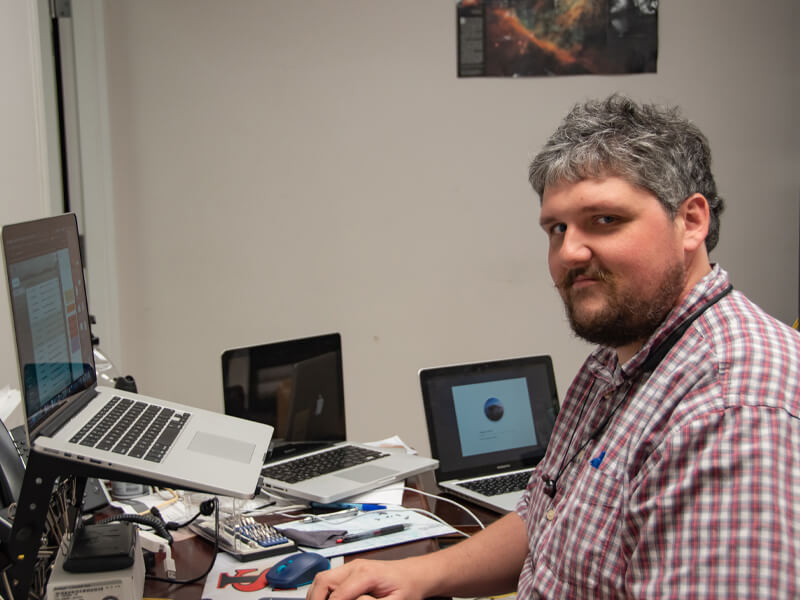Meet Mr. Cassidey, Technology Director.
St. Luke's: How long have you been with SLES?
Duncan Cassidey: 10 years
SL: What are your main responsibilities as an IT professional?
DC: Maintaining and managing the school networks
SL: What do you like most about your work?
DC: I get to solve deep technical problems and I get to help people resolve issues with technology.
SL: What do you like least about your work?
DC: Managing systems that I didn’t implement
SL: What kinds of problems do you deal with?
DC: My problems come in 3 main categories: Physical issues; devices not getting power, cables that are loose, buttons being pressed/not being pressed. Programming issues; incorrect settings, software not working as expected, a program working correctly but not doing what we expected. And training/need assessment issues; people not knowing the tool to use to solve a problem, people using the wrong tool or inefficiently using a tool to solve a problem, people not knowing how to describe the problem they need solved.
SL: How did you become interested in this field?
DC: I began working with networks in 1996 when I begged my father to purchase a Wifi router. We got a Microsoft Wireless-B router from Sam’s Club and I figured out how to set it up with our DSL modem and desktop computer. The next year my father and mother purchased parts, one by one, to build a custom computer. My older brother's high school friend helped me build it. We fried the motherboard with static electricity the first time.
SL: How did you begin your career?
DC: I graduated from University of South Alabama with a degree in Information Technology in 2011 and began working at St. Luke’s the following fall.
SL: What skills, abilities, and personal attributes are essential to success in your job/this field?
DC: Customer service first approach. Holistic problem solving, solving not just the problem at hand but solving the systematic issue that led to the problem. A bulldog like approach to issues, I hate leaving an issue partly solved or workable but not fully fixed. A keen eye to detail. And a desire to understand a system/device to the fullest.
SL: If you could do it all over again, would you choose the same path for yourself? If not, what would you change?
DC: This was my overall goal for my career. Work in an environment where I can be both hands-on to help people solve issues and implement changes in the systems to resolve problems. I worked corporate management during college at Barnes and Noble and knew the corporate world would not be my first choice. I intend to stay in the non-profit and education sector throughout my career. The only thing I might change is getting more experience under a Senior IT administrator/system administrator in a larger non-profit organization before joining the St. Luke’s family.
SL: How did your education help prepare you for this job?
DC: The School of Computing at USA focused on transferable skills, not learning specific systems or applications. That prepared me to take on a variety of challenges faster than people that had not been trained to be flexible. That being said, we saw very little of the kind of management that most of my job actually entails.
SL: Tell me about the project you are most proud of.
DC: A systematic overhaul of both the wired and wireless networks on both campuses. I have replaced every piece of networking equipment behind the scenes of the school over the years and brought it up to modern standards. Our Wifi networks are now near cutting edge and the dependability of wifi has gone way up. We have standardized management systems for both wired and wireless networks now.
SL: Which has been more valuable in your career, your education or your experience?
DC: My experience early in my life figuring out my home network sparked an interest that I fueled in college. Without that early exploration encouraged by my parents and brother, I don’t know if I would have pursued IT as a career.
SL: How do you keep your technology skills up to date?
DC: I read a lot of technology news and research a lot of systems the school could implement, even if we don’t end up using them. I am a part of several informal groups for system administrators and K-12 system administrators.
SL: What are your favorite and least favorite tech products? Why?
DC: My favorite Tech product isn’t really a product. I only custom build PCs for my home usage and I haven’t had a personal laptop in years. I almost never touch a laptop outside of work. I personally made and remade my desktop computer for years. I am still using the same computer case I got in college. I replaced all of the internal components several years ago and I have added mirrored storage a few years back. This reparability is not seen in almost any other kind of product.
For TV watching I custom built a PC by attaching all the components flat on to a finished piece of wood and hung it beside the TV.
Apple TV is garbage, it only lets you cast your screen to it if you are using an Apple device and it is more expensive than the competition. It is a product whose main purpose is to keep you using Apple products year after year.
SL: What are two or three major trends affecting the IT industry?
DC: Cryptolocker hackers are a major threat to all organizations, no business is safe. Chip shortages make all kinds of products hard to get and more expensive. Software as a service has fundamentally changed how we have to manage software.
Thanks Mr. Cassidey for celebrating National IT Professionals Day with us!

